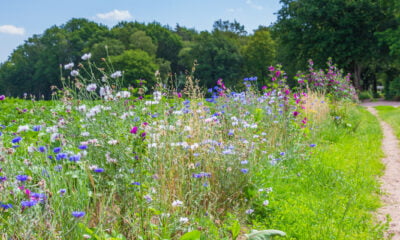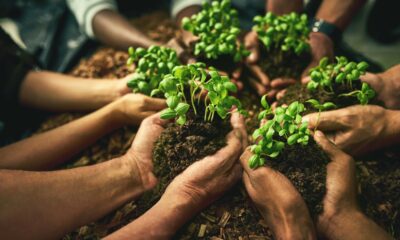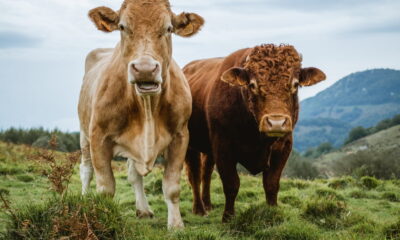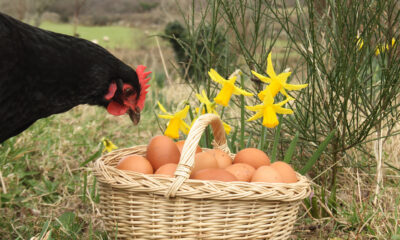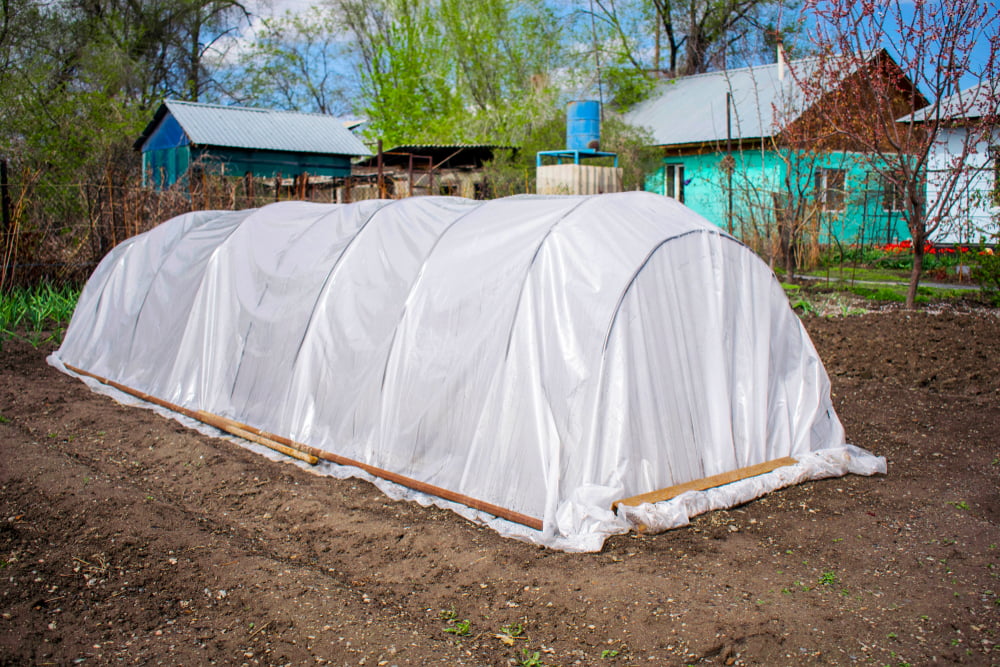

Environment
5 Benefits of Using Polythene as an Eco-Friendly Farmer
Sustainability is becoming a greater concern than ever before. A lot of farmers are searching for new ways to incorporate sustainable practices into their agricultural practices. WSU Insider reports that around a third of farmers are using environmentally friendly practices.
We have talked about some of the trends in sustainable farming. Today, we want to talk about the use of polythene mulch film, which can be eco-friendly. Keep reading to learn more.
Polythene Mulch Film Can Be Surprisingly Eco-Friendly
Are weeds invading your garden faster than you can pull them? Are fruits and vegetables shriveling up from lack of moisture? Is cold weather preventing you from early spring planting? These are the frustrations that a lot of farmers face.
You put hours of hard work into your land, yet face constant battles against weeds, drought, and unsuitable temperatures. It often seems everything is working against you. But what if there was an easy solution to all these problems?
Polythene mulch film could be the simple yet powerful product you’ve been seeking. This synthetic sheeting blocks weed growth, locks in soil moisture, and even warms or cools temperatures for your plants’ ideal needs.
If you’re intrigued and want to make the most of your agricultural investments, then keep reading. We’ll explore 5 major benefits polythene mulch films can bring to your farming operations.
What is Plastic Mulch?
Before detailing the immense benefits plastic mulch offers agriculture, let’s clearly define what this product is.
Plastic mulch — is a thin, waterproof polyethene sheeting that is spread across the top of growing beds or fields prior to planting. This synthetic material also referred to as agricultural film, comes on rolls that are unfolded and laid out to create a consistent, even barrier over the soil. The plastic mulch is secured in place by being buried around the edges or anchored down with soil, stones, or special landscape staples.
Once in place, the lightweight mulch film acts as a protective layer that blocks weed growth and retains moisture while modifying the soil temperature. Tiny planting holes are then cut into the sheeting to allow crops access to the warmed, moist earth below. As seeds germinate and crops develop, they poke through these holes surrounded completely by the plastic barrier.
The term “plastic mulch” differentiates this polyethene product from organic mulches like wood chips, leaves, or straws which decompose over time. The synthetic plastic mulch does not break down and thus continues improving crop growing conditions for months or even years.
You should also know that Plastic mulch comes in various thicknesses and colours, with the most common being black. Darker material absorbs heat well, warming up the soil for benefits we’ll soon discuss. But other hues like white, silver, red, and blue offer their own unique advantages.
Now that you understand exactly what this product is, let’s explore the 5 major benefits it brings to commercial farming and food production.
Benefit №1: It Suppresses Weed Growth
One of the biggest struggles farmers face is managing weed growth across large swaths of land. Weeding by hand or machine tilling is backbreaking work. Herbicides provide an easier approach, but many growers aim to use natural practices only.
Plastic mulch offers the best of both worlds – effective, chemical-free weed control with no labor-intensive weeding required! The solid polyethene sheeting forms an impenetrable barrier that blocks sunlight from reaching weed seeds or newly sprouted weeds below.
Without sunlight’s energy, weed growth is halted in its tracks. And the lack of space for weeds means all the soil nutrients and moisture go towards your intended crops. Even aggressive perennial rhizome spreaders like thistles, bindweed, and quackgrass are no match for impassable plastic mulch.
Without plant competition above and below ground, crop plants grow larger, fuller, and faster. Within your planting holes, crops stretch out roots and soak up the warm, enriched soil. Across a long growing season, the weed suppression equals higher yields per plant and far less work maintaining your fields. Thick black plastic is ideal for blocking all sunlight and serves as commercial growers’ top weed barrier.
Benefit №2: It Conserves Moisture
Inconsistent rainfall presents another major obstacle for growers. Periods of drought can stunt crops, reduce yields, and even kill off plants entirely. Yet even heavy storms may provide only temporary relief depending on soil drainage.
Plastic mulch comes to the rescue by locking existing moisture into the soil for steady plant access. The waterproof polyethene film prevents evaporation from sun, wind, and heat. This barrier retains ambient humidity and rainfall, creating an even moisture supply below.
With less water loss out the top, the earth retains hydration like a sponge. Plant roots then draw consistently from this reservoir. Drip irrigation systems beneath the plastic mulch penetrate deep into the soil, further preventing any dry patches.
The result is healthy, hydrated plants with lush green leaves and a vigorously growing habit. Fruits and vegetables swell to maximum proportions as the plant readily receives all the moisture it can handle. You’ll be amazed at the size difference in produce grown with and without plastic retaining walls.
While excess rains can still penetrate, the elevated beds created by this product keep crops’ roots up out of flooded zones. Growers achieve the best of both worlds – ample moisture retention yet rapid drainage after heavy precipitation. That’s the ideal balance for maximizing plant health and harvests!
Benefit №3: It Warms the Soil
Cool-weather presents a third major challenge for farmers aiming to get a head start on the growing season. While greenhouses allow earlier planting, these structures require significant investment. Soil temperatures may lag even if the air warms up.
Dark plastic mulch provides an affordable, low-tech alternative for heating up fields. As sunlight strikes the thin black polyethene, the colour absorbs a tremendous amount of heat. This warmth radiates downward into the soil, increasing subsurface temperatures by as much as 20°F!
The warmed earth triggers seeds to germinate earlier in the season than if sown on bare ground. Transplant roots also readily push down into the welcoming warmth. This leads to accelerated establishment and growth — setbacks other growers face from transplant shock simply don’t happen.
Earlier development means earlier harvests, allowing you to get your produce to market well before competitors. With protection against cool snaps, you may also be able to sow a second successive crop. The cumulative boost in annual yields can be quite substantial thanks to this heating advantage.
While most growers focus on warming the soil, some may need to cool overly hot planting beds during summer. Luckily, plastic mulch comes in light-coloured and reflective films perfect for bouncing away sunshine’s intense rays!
Benefit №4: It Can Cool Soil
While warming cold ground is essential in some climates, excessive summer heat causes issues for many growers. Hot soil stunts plants sensitive to heat stress like lettuce, spinach, radish, peas, and brassicas.
Plastic mulch offers a simple solution – switch to reflective films that bounce sunlight away rather than absorbing its rays. Silver and white polyethene redirect intense sunshine rather than convert it to infrared ground radiation.
As daylight hours hit peak intensity, the mirrored surface prevents overheating. Instead of baking crops, the mulch provides pleasant shading. Soil temps decrease by roughly 10°F, providing the cooler root zone these plants prefer.
In hot southern zones where summer highs hit 90°F+ for months, such relief prevents crop failure. Growers can stagger summer plantings with confidence by moderating the temperature extremes. Heat-loving plants like tomatoes, peppers and beans still thrive in black plastic beds nearby.
Plastic mulch’s versatility in either warming or cooling soil through simple colour change makes it an extremely adaptable tool. Farmers can fine-tune temperatures across their entire operation. Minding these details leads to substantially larger yields for minimal added effort and cost.
Benefit №5: It Boosts Crop Yields & Quality
We’ve explored how this product conquers three major environmental challenges – weeds, drought, and extreme temps. Overcoming these barriers means crops funnel more energy into growing lush, green foliage and abundant harvestable fruits. This can be a great way to adapt more sustainable farming practices.
With weed competition erased, moisture maxed out, and temperatures optimized, plants reach their full genetic potential. Tomatoes swell to beefsteak proportions. Peppers grow thicker and more crisp. Herbs and leafy greens are generated continually with no premature bolting.
By the end of the season, your warehouse overflows with bountiful produce. Even more satisfying – you’ll find far fewer insect nibbles, weather marks, and waste from spoliation. That’s because pristine fruits and veggies remained protected right until harvest.
Specialized plastic films take optimization even further. Red mulch boosts tomato yield and lycopene levels. White coats keep berries clean. Black warms up melons and corn. Silver bounces light onto lower leaves. And textured surfaces like cotton fabric increase airflow.
With so many options, farms utilize multiple coloured mulches across their operations based on site variations and crop needs. Careful attention to these details pays back tenfold. Pick your ideal film blend and start reaping the profits this season!



